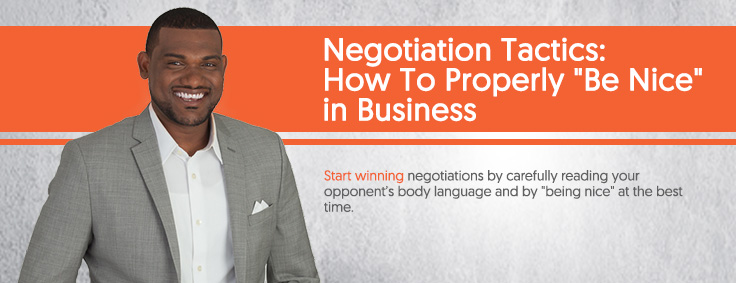“I don’t know why I conceded. The other negotiator just seemed so nice.” If you’ve uttered these words, there was a nice factor in play, even though you didn’t know it at the time.
There’s a value in “the nice factor” in negotiating. Being nice is perceptional, which depends on the person you are negotiating with. However, it does have a role in each negotiation. Enrich your negotiation outcomes through these ways.
Positioning
It all starts with the tone of the negotiation set by negotiators. It begins even before you’re at the negotiation table. Some negotiators make you feel like they’re a formidable force to be reckoned with and not to be taken lightly.
You should be watchful, and carefully assess if someone projecting a stern persona can be dealt with. In some cases, this type of projection is beneficial. But it is important that you take a look at the negotiation style of your counterpart. Be mindful of the persona you project at the start and during the negotiation.
The last thing you would want is turning the other negotiator into a more abstinent rival if they’re not already one. If it does happen, try to mollify them by adjusting your demeanor a bit – by being nicer.
Soft Negotiators
A soft negotiator usually comes up to you with a wide smile and a moderate handshake. As you get engrossed in the negotiation, consider what degree this façade may be. You can do this by taking note of the minor changes in their personality when you discuss points of disagreements. If they’re quick to mollify you, be sure to let them win some points too. Doing so enhances the nice factor.
Hard Negotiators
It may be more challenging to invoke the nice factor with hard negotiators. It may sometimes be inappropriate, depending on how moderate or obnoxious they’re turning out to be. Instead, match your persona to theirs, to get them to adjust their behavior. If successful, you can consider working your nice factor at that point. Depending on how they managed their demeanor, you can treat your niceness as their reward.
Negotiation Reset
Most people don’t want strong tensions when negotiating. When tensions get high, negotiators tend to be assertive about the positions they’ve taken. If you find yourself in this situation, consider using the nice factor. It can be in the form of conceding.
If you’re unsure if what you’re doing is easing the tension, preface your statement with an “if”. For example, “If I offer you this, will you do this?” The essence of the nice factor at this time will be attempting to reset the negotiation to a less tense position.
The more positive you are with the other negotiator, the easier the flow of the negotiation can be. It will eventually lead to better negotiation engagement, which can give a great outcome for you.
It’s All About Body Language
You’re always negotiating, every day. You can see the body language of every person you engage with. Start winning negotiations by carefully reading your opponent’s body language and using the nice factor at the best time.
